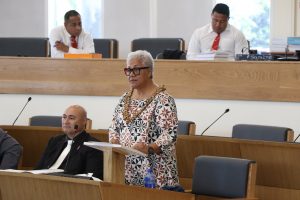Five months after Samoa’s controversial April election, the parliament reconvened this week for its first sitting led by the new government of Prime Minister Fiame Naomi Mata’afa, and her Fa’atuatua i le Atua Samoa ua Tasi (FAST) party. However, in extraordinary circumstances, the new government faced no opposition sitting across from them in the legislature. The parliament’s speaker, Papali’i Li’o Masipa’u, refused to allow the Human Rights Protection Party (HRPP) to attend parliament, citing their continued refusal to accept the election results.
The abnormal situation continues to prolong Samoa’s democratic difficulties. The legal wrangling over the election result was resolved in July when the country’s courts ruled that FAST did have the numbers to form a government, and that the ad hoc swearing-in ceremony performed out the front of the parliament — when the previous speaker refused FAST entry into the building — was legitimate.
This should have allowed normalcy to resume in the country’s politics, with HRPP submitting itself to the court’s ruling and taking up its important role as the country’s opposition. Yet, that is not what has happened. Instead the party has continued to dispute the election outcome, and claimed that the Court of Appeal violated the country’s constitution in its ruling that the ad hoc swearing-in ceremony was lawful. Several members of the HRPP are now facing contempt of court charges due to their public responses to the ruling.
Added to this, former Prime Minister Tuilaepa Sa’ilele Malielegaoi extraordinarily accused New Zealand Prime Minister Jacinda Ardern of a plot to install a female prime minister in Samoa. Here, Tuilaepa was demonstrating that the HRPP’s questioning of FAST’s legitimacy as a government is not just tied to its own sour grapes over losing the election – and, having governed the country since 1982, its sense of entitlement – but also to the idea that a woman is allowed to be the head of Samoa’s government.
These patriarchal norms are a prominent barrier to women throughout the Pacific. Across the region there is a distinct underrepresentation of women in national legislatures. The only three countries in the world that have no female representatives at national level — Vanuatu, Papua New Guinea, and the Federated States of Micronesia — are all in the Pacific. Fiame is now only the second woman to lead a government in the region, after Hilda Heine, former president of the Marshall Islands.
This difficulty in accepting the idea of a female prime minister is working in tandem with the broader global trend of a creeping deterioration of democratic norms and institutions. At the core of democracy is the essential need for parties to accept election results when they lose. Without this, the system begins to unravel.
So while Samoa’s parliament was able to sit this week with the new government finally taking up its position, without the opposition in place the democratic system is still lacking one of its most crucial components. This is why, although the speaker has refused to allow the elected HRPP representatives to attend parliament this week, it is important that he does provide them every opportunity to recognize the new government, be sworn in as members of parliament, and take up their rightfully earned positions on the opposition benches. The speaker cannot simply mimic the HRPP’s own refusal to allow FAST to be sworn in earlier in the year.
Yet for the HRPP there is a need to make serious decisions about their own direction and in particular about their leadership going forward into the future. Tuilaepa is obviously a towering figure in the HRPP, having been Samoa’s prime minister between 1998 and 2021. It is not easy to break ranks with someone who has dominated the party for so long, and who commands the respect afforded to him due to his long-standing service to the country. Yet this is the dilemma that the HRPP now finds itself facing.
If Tuilaepa cannot bring himself to accept the new government and bring his party into the parliament as the country’s necessary opposition, then it is the HRPP’s responsibility to the country to find a way to sideline him from his leadership of the party and recommit itself to Samoa’s democratic and institutional norms. Oppositions have highly important roles to play in holding governments accountable, but this accountability is tied to the work of scrutinizing in good faith the process of implementing policy, not incessant bad faith questioning of the government’s legitimacy.

































